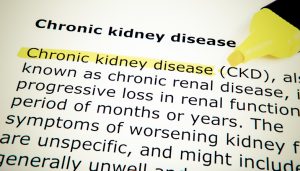
The main role of the heart is to pump out oxygenated blood, enabling all organs in the body to function properly. The kidneys’ role is to filter blood, remove waste, and help balance salt and fluids to ensure healthy blood pressure.
Numerous studies have demonstrated a higher risk of kidney disease in patients with heart failure. Kidney impairment makes the system regulating blood pressure work extra hard, so the heart pumps against higher pressure in the arteries.
If your doctor suspects you have a heart problem, they will also go a step ahead and check your kidney function because of the close link between the two.
Chronic kidney disease linked with heart disease is common in elderly: Study
Chronic kidney disease linked with heart disease is common among the elderly, according to research findings. The researchers assessed chronic kidney disease prevalence in 1,028 persons in their 80s.
Prevalence of chronic kidney disease was quite high. Depending on the equation used, the prevalence ranged between 31 to 51 percent. Study author Dr. Mark Sarnak said, “Unfortunately, there is no gold standard estimating equation that has been developed or validated in octogenarians.”
On the other hand, chronic kidney disease has always been associated with heart disease. “Therefore, even in the very old, kidney function appears to be a marker of vascular disease,” Dr. Sarnak added.
Kidney failure risk in kidney disease patients reduced by heart-healthy lifestyle
Lead researcher Paul Muntner explained, “Scores on the Life’s Simple 7 tool have been associated with risk for having a heart attack, but it was unclear whether a worse profile would be associated with an increased risk for developing kidney failure.”
The researchers aimed to look for a link between kidney failure and death among 3,093 individuals with stage 3 or 4 chronic kidney disease. During an average follow-up of four years, 160 participants developed kidney failure and 610 died.
Here’s what the study has found:
- Compared to persons with zero or one of the Life’s Simple 7, those with two or more had lower risk of kidney failure.
- None of the participants who had five to seven of the factors developed kidney failure.
- Risk of death was cut by 40 percent if they had four ideal factors.
Dr. Muntner added, “This study highlights the importance of maintaining a healthy lifestyle, not just on patients’ risk for developing heart disease but also for the prevention of kidney failure.”
Treating heart disease in people with chronic kidney disease
Because chronic kidney disease and heart disease are so closely related, some treatment options for heart disease can also work to improve kidney disease and reduce the risk of progression into kidney failure. Lifestyle habits can go a long way in protecting the heart and the kidneys. As outlined by the American Heart Association’s Life’s Simple 7, it begins with regular exercise, eating a heart-healthy diet, maintaining a normal weight, not smoking, and maintaining low blood sugar, blood pressure, and cholesterol levels. These are the fundamentals to a strong heart – and healthy kidneys, too.
In particular, eating more fruits and vegetables can go a long way, not only for your heart, but for your kidneys, too. A study has found that adding fruits and vegetables into your diet may help protect the kidneys in chronic kidney disease patients. A typical Western diet is mainly based on animal and grain foods –which are very acidic. In kidney disease, the kidneys are unable to remove the excess acid from the body, so it accumulates and builds up (leading to metabolic acidosis).
Increasing the intake of fruits and vegetables has been found to reduce acidity and alkalize the body, this way helping to preserve kidney function.
The researchers looked at 71 patients with hypertensive stage 4 kidney disease who received fruits and vegetables or an oral alkaline medication for one year.
Here’s what the study uncovered:
- After a year, kidney function was similar in both groups.
- One-year plasma total carbon dioxide (PTCO2) increased in both groups, signifying a decrease in metabolic acidosis. PTCO2 levels were lower in those eating more fruits and vegetables.
- Urine measurements of kidney injury were lower in both groups.
- Potassium levels did not increase.
Along with healthy lifestyle habits, it’s also important to follow any recommendations your doctor has laid out. This may include taking certain medications regularly to ensure your heart stays strong.
Keeping your heart and kidneys healthy isn’t too difficult – it just takes some dedication to live a healthy lifestyle as much as possible.